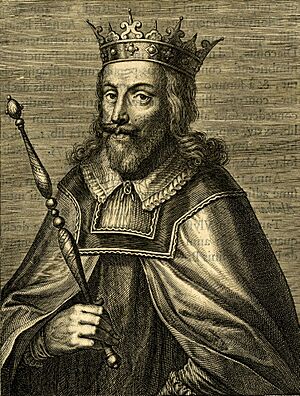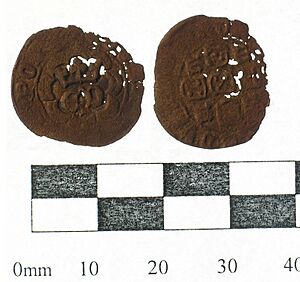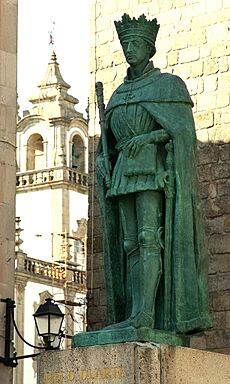Edward, King of Portugal facts for kids
Quick facts for kids Edward |
|
|---|---|

Portrait in Juan Caramuel y Lobkowitz's "Philippus Prudens", 1639
|
|
| King of Portugal | |
| Reign | 14 August 1433 – 9 September 1438 |
| Predecessor | John I |
| Successor | Afonso V |
| Born | 31 October 1391 Viseu, Portugal |
| Died | 9 September 1438 (aged 46) Tomar, Portugal |
| Burial | Monastery of Batalha |
| Spouse | |
| Issue |
|
| House | Aviz |
| Father | John I of Portugal |
| Mother | Philippa of Lancaster |
| Signature |  |
Edward (Portuguese: Duarte [duˈaɾt(ɨ)]) was the King of Portugal from 1433 until his death in 1438. He was also known as Edward the Philosopher King or the Eloquent. He was born on October 31, 1391, in Viseu, Portugal.
Edward was the son of John I of Portugal and Philippa of Lancaster. He was part of a special group of royal children. This group was called the "Illustrious Generation". They helped Portugal grow and develop in the 15th century.
Contents
Becoming King: Edward's Early Life
Edward was the second son of King John I. He became the heir to the throne after his older brother Afonso passed away in 1400.
Before he became king, Edward worked closely with his father. He learned a lot about how to rule the kingdom. In 1415, he was made a knight. This happened after Portugal captured the city of Ceuta in North Africa. Ceuta is located across from Gibraltar.
Edward became king in 1433. His father died from a serious illness that was common at the time.
Edward's Reign: A King Who Listened
As king, Edward wanted everyone in his country to agree on important decisions. During his five years as ruler, he called the Portuguese Cortes (which was like the national assembly or parliament) five times. They met to talk about the country's issues.
He also continued his father's work in exploring the world. He supported his famous brother, Henry the Navigator. Henry led many trips along the west coast of Africa. In 1434, an explorer named Gil Eanes sailed past Cape Bojador. This was a big step. It opened the way for more exploration down the African coast.
Challenges in North Africa
The city of Ceuta, which Portugal had captured, became a problem. It cost a lot of money to keep it. People realized that Ceuta wasn't very useful without the nearby city of Tangier. After Ceuta was taken, trade caravans started going to Tangier instead. This made Ceuta less important for trade.
In 1437, Edward's brothers, Henry and Ferdinand, convinced him to attack the Marinid kingdom in Morocco. Not everyone agreed with this plan. Even the Pope advised against it. Edward's other brothers, Infante Peter and Infante John, thought it was a bad idea. They wanted to avoid fighting the Marinid Sultan.
Their concerns were right. The attack on Tangier, led by Henry, was a disaster. The Portuguese army could not capture the city. Soon, they were surrounded by a Moroccan army. They ran out of food and had to surrender. Henry promised to give Ceuta back to the Marinids. In return, the Portuguese army was allowed to leave safely. Ferdinand, Edward's youngest brother, was given to the Marinids as a hostage. He would stay there until Ceuta was returned.
Edward's Final Years
The failure at Tangier greatly affected Edward. His brothers Peter and John wanted him to keep his promise. They urged him to give Ceuta back and free Ferdinand. But Henry, who had signed the treaty, wanted to break the promise.
Edward was unsure what to do. He called the Portuguese Cortes together in Leiria in 1438. They discussed the problem. The Cortes decided not to approve the treaty. They wanted to keep Ceuta. They asked Edward to find another way to free Ferdinand.
Edward passed away later that summer in Tomar. Like his father, he died from a serious illness. Some people believed he died from sadness over his brother's situation. Ferdinand remained a prisoner in Fez until his own death in 1443.
Edward's Impact and Legacy
Edward's early death caused problems in Portugal. He left behind a young son, Afonso, to become king. Everyone thought Edward's brothers would rule the country until Afonso was old enough. However, Edward's will said his wife, Eleanor of Aragon, should be the regent. A regent is someone who rules for a young king or queen.
Eleanor was not very popular. People in the cities, led by John of Reguengos, wanted Peter of Coimbra to be the regent. But the nobles supported Eleanor. This almost led to a civil war. In the end, Eleanor and Peter agreed to share power.
Edward was also a very thoughtful and educated person. He wrote two books: O Leal Conselheiro (The Loyal Counsellor) and Livro Da Ensinança De Bem Cavalgar Toda Sela (Book of Teachings on Riding Well on Every Saddle). He also wrote several poems. When he died, he was working on updating Portugal's laws.
Family Life
Edward married Eleanor of Aragon in 1428. She was the daughter of Ferdinand I of Aragon.
Edward and Eleanor had several children, including:
- Afonso, who became the next King of Portugal.
- Ferdinand, who was the father of a future king, Manuel I.
- Eleanor, who became the Holy Roman Empress.
- Catherine, who became a nun.
- Joan, who became the Queen of Castile.
 In Spanish: Eduardo I de Portugal para niños
In Spanish: Eduardo I de Portugal para niños
|
Edward, King of Portugal
House of Aviz
Cadet branch of the House of Burgundy
Born: 31 October 1391 Died: 9 September 1438 |
||
| Regnal titles | ||
|---|---|---|
| Preceded by John I |
King of Portugal 1433–1438 |
Succeeded by Afonso V |
 | May Edward Chinn |
 | Rebecca Cole |
 | Alexa Canady |
 | Dorothy Lavinia Brown |



